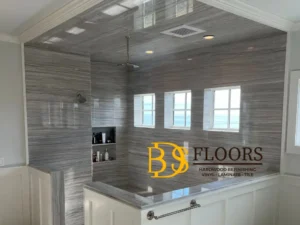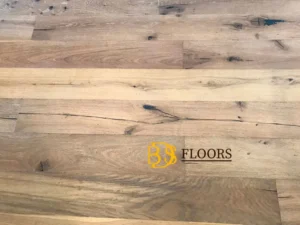If you’re researching the pros and cons of cork flooring, we assume you have a good reason for doing so. Perhaps you’re tired of the coldness of your bedroom tiles in the morning, the slipperiness of your laminate flooring, or the allergy-inducing nature of your carpet. Cork flooring might be the solution you’re looking for, so in this article, we will discuss the various types of cork flooring, their advantages and disadvantages, and recommend some reputable brands. We’ll also guide you on where to purchase cork flooring.
If you’re considering cork flooring for your home, you might be curious to learn more about this material. Despite being less common than traditional carpet or hardwood flooring, cork flooring has many applications in different areas of the house, including kitchens, bathrooms, and playrooms. It’s important to note that, like any flooring material, cork has its own set of benefits and drawbacks that you should be aware of before committing to it as a flooring option.
So First of All: What Exactly Is Cork Flooring?
Cork flooring is made from cork bark obtained from cork oak trees. It’s manufactured by grinding up leftover materials from wine cork production, bonding it with resin, and pressing it into sheets, planks, and tiles. Since it’s made from waste materials, it’s considered an eco-friendly flooring option. There are many different types of cork flooring available, with varying installation difficulty and environmental benefits. Some disadvantages of cork flooring may be specific to certain products. Overall, cork flooring can be divided into two main categories.
Traditional “Natural”, or “Solid” Cork Flooring
The first type of cork flooring is called traditional, natural, or solid cork flooring, which has been available for a long time. The terms natural and solid are often used interchangeably in the cork flooring industry, even though all cork is natural. To simplify, this type of cork flooring does not have a special HDF or plywood base layer, and is made entirely of cork. It’s usually sold as glue-down tiles or can be cut directly from cork oak trees and glued onto the subfloor. Depending on the fineness of the cork grind, it can be molded into different patterns and textures, resembling traditional wood floors. The variety of stains available can also imitate traditional wood flooring colors.
Engineered Cork Flooring
Engineered cork flooring is a type of cork flooring that consists of a plywood or HDF base layer with a cork veneer on top. It is usually sold as click-together flooring but can also be installed using other methods like glue-down, tongue and groove, or peel-and-stick options.
Corkoleum is a type of engineered cork flooring that uses recycled rubber as its base layer with a polyurethane core, making it less prone to water absorption. It is only 3mm thick, so it can be glued over existing floors without losing vertical space. It is a high-tech version of engineered cork flooring that solves one of the main disadvantages of cork flooring.
Peel-and-stick cork tiles are another type of cork flooring that can be purchased as natural or engineered products. They can be installed easily, but they may peel up from the adhesive over time. However, repairs are simple as you can replace damaged tiles with new ones.

What is Cork Underlayment?
In addition to solid and engineered cork flooring, there is also cork underlayment. This material is placed between the subfloor and the finished surface of your flooring. The subfloor is the foundation that supports the finished floor and is typically made of concrete, plywood, or a similar material.
Underlayment is usually designed to be soft and provide sound-dampening properties, as well as other benefits to enhance the comfort of your floor. Cork underlayment is an excellent solution for adding cushioning to concrete subfloors or correcting minor imperfections.
By placing cork sheets under hardwood, stone, or tile flooring, you can incorporate all the advantages of cork flooring (without the disadvantages) that are described below.
The Advantages of Cork Flooring
Let’s talk about the advantages of cork flooring, which can improve your home’s comfort and save you money. Firstly, cork floors have natural thermal insulation properties, with a 3.0 R-Value per inch of thickness, making them an economical alternative to heating wood floors. This means you can enjoy warm feet without the need for expensive radiant floor heating systems.
Cork flooring has numerous advantages that make it a popular choice for homeowners. Its soft, cushiony feel provides comfort underfoot, making it ideal for rooms where you stand for long periods. Additionally, cork is hypoallergenic, repelling dust mites and allergens to improve indoor air quality. Cork is also an eco-friendly option, as it’s harvested from the bark of cork oak trees without damaging them, and is completely biodegradable. Moreover, cork is an excellent insulator of both sound and temperature, reducing energy bills. Finally, cork is easy to install and maintain, requiring only basic upkeep like occasional sealing and regular cleaning. If you need to restore it, sanding, staining, and sealing can remove imperfections.
Secondly, engineered cork flooring is ideal for DIY enthusiasts, as it usually comes with click-lock installation grooves, which make it easy to install, similar to fake wood floors like vinyl and laminate. Additionally, cork flooring is a sustainable, biodegradable, and eco-friendly option, with cork oak trees harvested every nine or ten years for up to two centuries. This makes it a more sustainable and eco-friendly choice than hardwood trees, which take decades to mature, and can only be harvested once.
Lastly, it’s important to note that many eco-friendly flooring options have FloorScore certification.
Cork flooring has a multitude of benefits, including sound-dampening properties due to the abundance of tiny air pockets within the material. It is quiet and comfortable, making it an excellent option for any room in the house. The springy nature of cork makes it easy on the joints, which can help reduce joint and back pain. Additionally, cork contains suberin, a naturally occurring waxy substance that acts as a fire retardant and makes cork flooring antimicrobial and hypoallergenic. Cork can be refinished as long as it is at least 4mm thick, and the busy pattern of cork flooring can disguise minor flaws and scratches while self-repairing over time. It is important to buy cork flooring from a reputable manufacturer to ensure that it is genuine and high-quality.
Cork is highly sought after for its comfort and convenience. It is incredibly soft and pliable, making it a popular choice for areas where people will be standing for extended periods, such as kitchens. It also provides a cushioning effect in the event of accidental falls, making it ideal for homes with children or seniors.

Cork contains a natural substance known as suberin, which repels insects and prevents the growth of organisms. This attribute contributes to creating a healthy environment.
Cork features numerous small air-filled chambers that act as barriers against sound transmission, effectively insulating any room. This characteristic also helps to save money on heating and cooling expenses. Additionally, cork is excellent at dampening noise, making it an ideal flooring option for noisy rooms.
The Disadvantages of Cork Flooring
Cork flooring has some disadvantages, but they are not major issues. However, it is important to be aware of these drawbacks to avoid potential problems in the future. One of the common issues with cork flooring is that it can fade when exposed to direct sunlight or UV lamps. To avoid this, it is recommended to choose products with UV-resistant finishes. Cork floors also don’t do well with big changes in humidity, so a humidistat can help regulate moisture levels. Engineered cork flooring is not as eco-friendly as solid cork flooring due to the use of adhesives and fiberboard. Another disadvantage of cork flooring is that it can absorb water, although it is relatively water-resistant. Solid and engineered cork floors have varying degrees of water-resistance depending on the product, manufacturer, varnish, and installation method. Cork flooring is not recommended for areas with excessive moisture, such as mudrooms or bathrooms.
Cork flooring is susceptible to damage
Due to its softness, cork flooring is more vulnerable to scratches from pet claws and permanent dents from heavy furniture or appliances. Pet owners should keep their pets’ nails trimmed, and furniture coasters are recommended to prevent damage.
Cork flooring can be expensive
Cork flooring is more expensive than vinyl, laminate, and many other materials, ranging from $5 to $20 per square foot.
Pro Tip: Artificial flooring options like printed laminate or luxury vinyl tiles can mimic cork’s appearance if you want a cheaper alternative.
Cork flooring is not completely waterproof
Although cork is more water-resistant than other materials, it still requires regular sealing and should not be mopped with excessive water as it can warp or stain.
Cork flooring has a limited color range
Cork flooring has a limited color palette compared to hardwood, laminate, vinyl, or carpet, mostly consisting of beige tones.
Pro Tip: Artificial flooring options like printed laminate or vinyl flooring can offer more color variety.
Cork flooring can fade in sunlight
Cork flooring is not ideal for bright rooms as it can fade with excessive sun exposure.
Cork floors are resistant to scratches, but sharp objects can leave permanent damage, while blunt objects can break through the finish. Glue-down installation of cork flooring can be challenging, but professional installation is worth the cost for optimal water-resistance and clean aesthetics. Cork floors require regular maintenance and sealing every few years to avoid water damage and crumbling. Staining cork floors can create an uneven appearance, but prefinished cork planks can be purchased to avoid this issue. Some people consider cork floors to be overly trendy, but they are still a great flooring option. If concerned about long-term resale value, other wood flooring options may be a better choice.
Congratulations! You have now learned about the advantages and disadvantages of cork flooring. If you’re ready to take the next step and decide which flooring is right for you, we recommend consulting with a local flooring store. These experts think about floors on a daily basis and can offer valuable advice.
For a wider range of options, it’s recommended to visit specialty flooring stores when shopping for cork flooring. Among the top suppliers of cork flooring are Globus Cork Flooring, which offers cork tiles in various sizes and colors, shipped from their New York factory. WE Cork offers multiple lines of tiles and planks with different shades and styles in both floating and glue-down options. iCork Floor is a factory-direct distributor that offers affordable cork tiles and planks in both floating and glue-down styles through its website. APC Cork is a leading North American supplier of cork flooring with a broad range of floating and glue-down options available in 87 styles through specialty flooring stores. Heritage Mill, on the other hand, is the brand of cork flooring sold at Home Depot, with two types of floating plank cork products priced between $1.99 to $3.09 per square foot.
We hope that your cork flooring will provide you with warmth, comfort, and a healthy living environment. May you also enjoy the financial benefits, durability, and quietness that cork flooring offers.
Cork flooring is often preferred over hardwood flooring as it is a renewable resource, unlike hardwood where trees are killed during harvesting. If you value sustainability, bamboo flooring is another option to consider. Bamboo is derived from the bamboo grass plant, which continues to grow after being cut. Although bamboo flooring looks different from cork, both materials offer unique appeal and are different from hardwood. One advantage of bamboo flooring over cork is that it is a harder material and more resistant to scratches and dents. However, it does not have the soft, resilient feel or the sound and thermal insulation properties of cork.
Conclusion
Cork flooring is a great choice if you’re seeking a warm, attractive flooring material with a relaxed, informal appearance. However, if you desire a floor that remains perfectly pristine, cork may not be the right choice as it is a relatively soft material that develops a patina of wear over time.







